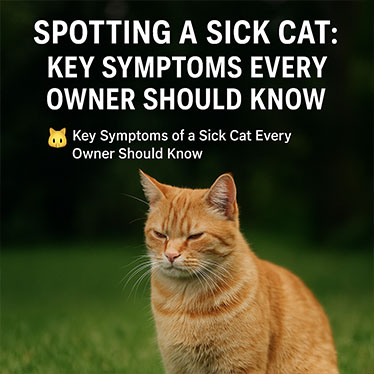
🩺 Why Spotting a Sick Cat Early Matters
Cats are notorious for hiding signs of illness. Their instincts tell them to mask weakness, which makes it harder for pet owners to recognize when something is wrong. By spotting a sick cat early, you can respond faster, reduce suffering, and improve treatment outcomes.
At Qualified Pet Services, we’ve worked with many cats in various states of health, and we always stress the importance of early detection. Whether you’re a new cat parent or an experienced feline lover, these red flags can help you know when to call the vet.
🚨 Key Physical Symptoms to Watch For
Cats may not be able to speak, but their bodies often tell us what’s wrong. Look out for these physical signs:
- Changes in appetite or weight: Refusing food or overeating can both signal illness. Sudden weight loss should never be ignored.
- Lethargy: If your cat is sleeping more than usual or seems unusually tired, something may be off.
- Vomiting or diarrhea: While occasional hairballs are normal, frequent vomiting or loose stools could indicate GI issues or other systemic problems.
- Difficulty breathing: Labored or noisy breathing is a red flag that requires immediate vet attention.
- Poor coat condition: A dull, greasy, or unkempt coat may suggest an underlying health issue.
- Unusual lumps or swelling: These could be signs of infection, inflammation, or even tumors.
🧠 Behavioral Red Flags in Sick Cats
Behavior changes can be subtle but are often the first clues that your cat isn’t feeling well:
- Hiding more than usual
- Increased aggression or irritability
- Changes in litter box habits (urinating outside the box, straining, or excessive trips)
- Increased vocalization or unusual silence
- Loss of interest in play or social interaction
If your normally social kitty is suddenly hiding under the bed or seems to want less attention, it’s time to investigate.
🍽 When Eating and Drinking Habits Change
Even small changes in eating or drinking patterns could indicate serious issues such as:
- Kidney disease
- Diabetes
- Hyperthyroidism
- Dental disease
Dehydration in cats can quickly lead to complications, so always monitor water intake. Try gently lifting the skin at the scruff—if it doesn’t bounce back quickly, your cat might be dehydrated.
💡 How to Act Early
If you notice any combination of these symptoms for more than a day or two, don’t wait. Schedule a vet visit, and bring notes about what you’ve observed. If your cat needs care while you’re away, be sure to work with sitters who have veterinary experience. Our team of veterinary professionals is trained to recognize concerning signs and respond appropriately.
🧴 Preventive Care and Wellness
- Schedule regular vet visits
- Brush your cat’s teeth or use dental treats
- Keep vaccines up to date
- Feed a high-quality, vet-approved diet
- Monitor behavior and physical appearance weekly
Regular wellness checks at home paired with professional support go a long way toward keeping your feline healthy.
📚 References
- American Association of Feline Practitioners. (n.d.). Signs of a Sick Cat. Retrieved August 31, 2025, from https://catfriendly.com/cat-care-at-home/signs-of-a-sick-cat/
- Cornell University College of Veterinary Medicine. (n.d.). Feline Health Topics. Retrieved August 31, 2025, from https://www.vet.cornell.edu/departments-centers-and-institutes/cornell-feline-health-center/health-information
- PetMD. (n.d.). How to Tell if Your Cat Is Sick. Retrieved August 31, 2025, from https://www.petmd.com/cat/general-health/how-tell-if-your-cat-sick
⚠️ Disclaimer
This blog is for educational purposes only and should not replace professional veterinary advice. If your cat is showing signs of illness, contact a licensed veterinarian.


